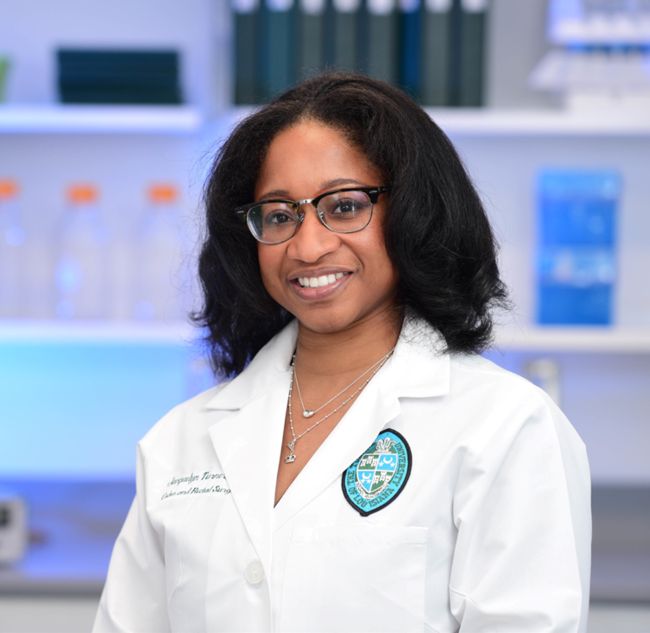Dr Kendra Outler recently had the pleasure of speaking with Medical Doctor Jacquelyn Seymour Turner, Professor of Surgery at Tulane University School of Medicine, on the What the Doctor Say with DrK podcast. The topic was colorectal disease. Dr Turner also holds the positions of Vice Chair of Surgical Education as well as Section Chief, Colon and Rectal Surgery at Tulane.
 Dr Jacqueline TurnerDuring Part One of the podcast discussion, Dr K spoke to Dr Turner about her specialty, colorectal disease and in particular, its impact on the African-American community, healthcare access disparities, and how to increase awareness about colorectal disease. If this topic has touched you or your family, please also listen to to Part Two of the series on this topic.
Dr Jacqueline TurnerDuring Part One of the podcast discussion, Dr K spoke to Dr Turner about her specialty, colorectal disease and in particular, its impact on the African-American community, healthcare access disparities, and how to increase awareness about colorectal disease. If this topic has touched you or your family, please also listen to to Part Two of the series on this topic.
Race, economics play a key role in colorectal disease and health disparities
Healthcare access, or a lack of it, is one of the biggest obstacles to patients in poorer communities getting treatment for colorectal disease and cancer, according to Dr Turner. The Latino population is one of the least insured, compared to the Black, white and Asian communities. However, Black patients still have the worst mortality rate.
Dr Turner said that when we look at whether these racial population groups are getting better access compared to their white counterparts, research shows that poorer populations have worse experiences in getting access to healthcare than higher-income populations.
Awareness is improving, but still needs work
The percentage of people getting colorectal screening tests is slowly improving. Currently, 77.6% of the White community is getting screening done, compared to about 70% of the Black and African-American community. As Dr Turner noted, advances are being made when it comes to screenings getting done within minority groups, but there’s still work to be done.
The reason screening numbers must improve is because the African-American community still has the highest mortality rate due to colon and rectal cancer. Forty-six percent of African Americans were expected to die from colorectal disease in 2021, compared to 39 percent of whites and 30 percent of Asian groups.
The recommended age change for screenings is perhaps the most critical message that needs to be spread, Dr Turner said. For years, people were encouraged to get screened, preferably with a colonoscopy when they turned 50. In recent years the recommended age changed to 45 – for African-Americans in particular – because of the higher colorectal cancer rates within the community. Now, 45 is the target age for everyone.
“We have to educate people because there’s still a lot of people that think that age 50 is the appropriate age to start your screening colonoscopy,” Dr Turner said.
The science behind colorectal diseases
Dr Turner noted that her research showed that African-Americans tend to have “right-sided” tumors in terms of the colon. The right side, known as the ascending colon, is one of the colon’s four parts. Many African-Americans present with right-sided tumors, which can grow rather large before they become symptomatic. Sometimes, they present at a much later cancer stage.
Diet is perhaps one of the biggest contributors to colorectal disease. Dr Turner noted that the Black community from Africa typically consumes a diet high in fiber, while African-Americans often eat a very fatty diet. Part of the reason for such a dramatic difference in diet is a lack of healthy food access in the US, and the result is higher colon and rectal cancer rates.
“There’s a lot of socioeconomic play in this,” Dr Turner said. “One study flipped the diets between our African cohorts and found that when we flipped them, they were seeing more colon and rectal cancers in that population. So, I think a lot of it is environmental, with some socioeconomic factors playing a part.”
Colonoscopies are the screening of choice
While there are a number of choices available to screen for colorectal diseases, colonoscopy is the gold standard. It’s the only test that can also detect polyps regardless of size. When they’re detected through a colonoscopy, they can be removed at the same time.
Other detection tests include fecal occult blood testing (to look for blood in the stool), immunohistological testing, FIT, fecal immunohistological testing, and fecal DNA. Dr Turner recommended the occult blood test be done annually.
“You really should combine that test with some kind of endoscopy,” she said. “It’s still one of the recommendations on our colorectal society’s guidelines as a viable alternative to doing a colonoscopy.”
DrK posed the question of how we can ensure everyone gets access to the “gold standard” colonoscopy regardless of their healthcare status. Dr Turner responded with the reminder that every state is different when it comes to access, but that she hopes to create in Louisiana a program like the one she did in while working in Atlanta at Morehouse. There, she helped implement programs that allowed people of all insurance statuses to get FIT testing, which allowed those who were highly at-risk to get evaluated quickly.
“We have to have equity in the research as well, “Dr Turner said. “I am glad that with our recent diversity, equity, and inclusion initiatives, that African-Americans are getting more attention.”
Click here to listen to the full conversation between DrK and Dr Turner.
Read and listen to Part 2 of this series